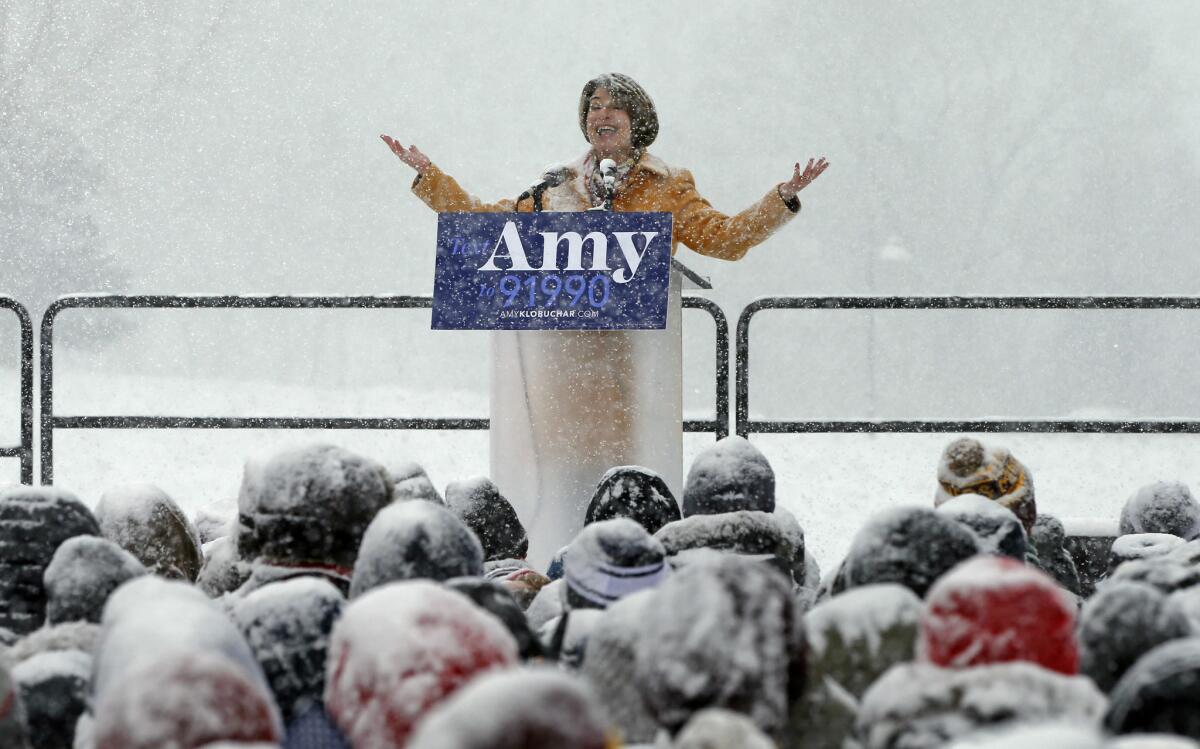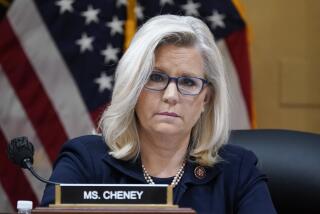Amy Klobuchar ends presidential campaign, endorses Joe Biden

After a disappointing finish in South Carolina, Minnesota Sen. Amy Klobuchar announced Monday she was ending her presidential campaign.
Klobuchar’s exit came just weeks after a surprise third-place showing in the New Hampshire primary, which she hoped would propel her through the rest of the early states and onto Super Tuesday. But she finished in sixth place in both the Nevada caucuses and South Carolina primary.
On Monday night, she endorsed former Vice President Joe Biden.
Although the former prosecutor periodically showed moments of momentum, including fundraising bumps after strong debate performances, it never solidified into the level of support she needed to continue her bid. Klobuchar’s exit leaves Massachusetts Sen. Elizabeth Warren and Rep. Tulsi Gabbard as the only women in what started out as a historically diverse Democratic presidential field.
Klobuchar’s performance during the campaign could put her on lists of potential running mates or Cabinet appointees. The Midwesterner launched her bid in February 2019 during a blizzard on the banks of the Mississippi River. President Trump responded to the images of her hair covered in a blanket of snow by tweeting, “she looked like a Snowman(woman)!”
She responded by asking how his hair would have fared in a blizzard.
Klobuchar, 59, who sprinkled her campaign speeches with self-deprecating tales, was known to tell one about her own hair on that day — and about the terror her hairdresser felt. She had sprayed color on Klobuchar’s roots to hide some emerging gray, and watched the campaign announcement petrified that the snow would make it melt into brown streaks running down the candidate’s face. After the mom jokes or funny stories, Klobuchar would turn serious.
Reflecting her record in the Senate, Klobuchar campaigned for president firmly in the moderate lane. She eschewed policies from the liberal wing of her party such as “Medicare for all” and free college for everyone. She favored more modest approaches such as preserving private insurance while creating a government option for healthcare, or expanding federal grants for college tuition and reducing student debt.
“That is the difference between a plan and a pipe dream,” Klobuchar said frequently.
In her Senate races, Klobuchar’s earnest, middle-of-the-road approach allowed her to win conservative swaths of her state that voted for Trump, and in her presidential bid, she often pointed to her legislative record working with Republicans on issues such as the farm bill and lowering the cost of prescription drugs. She was the candidate, she argued, who could win back the Midwestern and Rust Belt voters that Democrats lost in 2016.
Her campaign outlasted those of far more prominent politicians such as Sens. Kamala Harris of California and Cory Booker of New Jersey, and former Rep. Beto O’Rourke of Texas. She qualified for every debate stage, and in January, she won half of the controversial dual endorsement from the New York Times (along with Warren).
But to continue her campaign, Klobuchar needed to show the ability to overtake Biden’s nearly half-century resume. She never did.
More to Read
Get the L.A. Times Politics newsletter
Deeply reported insights into legislation, politics and policy from Sacramento, Washington and beyond. In your inbox three times per week.
You may occasionally receive promotional content from the Los Angeles Times.











